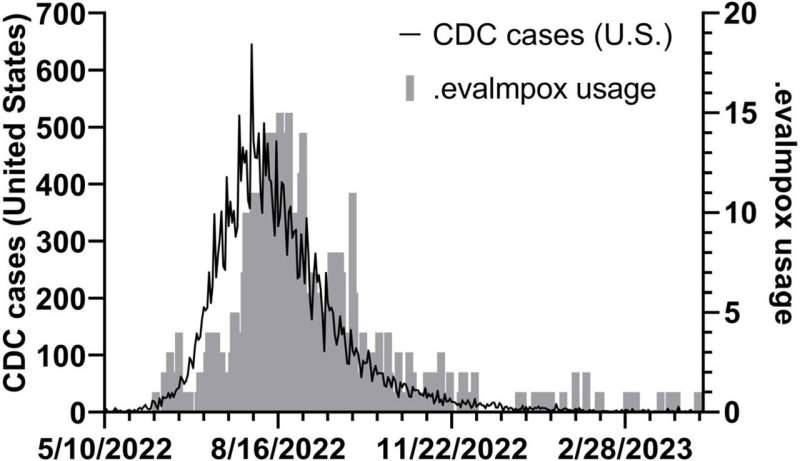This article has been reviewed according to Science X's editorial process and policies. Editors have highlighted the following attributes while ensuring the content's credibility:
fact-checked
trusted source
proofread
New electronic medical record tool helps clinicians diagnose mpox

Diagnosing infectious conditions can be challenging. Diagnosis is especially challenging for uncommon and emerging infectious diseases for which there's limited clinical experience. Nevertheless, successfully identifying patients with infectious diseases, especially communicable ones, is critical, so patients can be isolated to reduce disease spread.
To address this challenge, investigators from Massachusetts General Hospital, a founding member of the Mass General Brigham health care system, recently developed and validated a computer program that can be incorporated into electronic medical record systems to help clinicians diagnose mpox (formerly known as monkeypox).
The research is published in Infection Control and Health care Epidemiology.
"We built a novel decision support tool embedded in the electronic medical record that guides clinicians on crucial features of the physical examination and on important questions to ask patients with possible mpox," said lead author Jacob Lazarus, MD, Ph.D., a physician investigator in the Division of Infectious Diseases within Massachusetts General Hospital's Department of Medicine, and an instructor in Medicine at Harvard Medical School.
The clinical decision support system, called EvalMpox, proved useful in patients presenting to medical care with a rash. Its utility was assessed in 668 patient visits from more than 100 clinical locations across Greater Boston, Nantucket, Martha's Vineyard, western Massachusetts, and southern New Hampshire.
EvalMpox guided clinicians in asking patients about potential mpox exposures, about symptoms of mpox, and in performing a physical examination to look for the characteristic mpox rash. EvalMpox was then able to use these answers to classify a patient as "likely to have mpox" or "unlikely to have mpox."
The investigators found that the patients deemed likely to have mpox had similar characteristics compared with patients confirmed to have mpox. These patients were then prioritized for testing, and they were significantly more likely to test positive for mpox than patients deemed unlikely to have mpox.
"Our program identified nearly all cases of mpox diagnosed in the MGB system during the study period, underscoring the value of clinical decision support tools in assisting clinicians with early identification, isolation, and management of patients with communicable diseases like mpox," said senior author Erica S. Shenoy, MD, Ph.D., Chief of Infection Control for Mass General Brigham and an associate professor of Medicine at Harvard Medical School.
The tool also had a high negative predictive value, meaning that if EvalMpox indicated that a person was low risk for mpox, it was very unlikely that they had the infection. "The tool's high negative predictive value is also important," emphasized Dr. Shenoy.
"While the importance of early identification and isolation to prevent risk of transmission of disease cannot be overemphasized, we also know that it is critically important to have efficient ways to determine when isolation can be discontinued, and to reassure patients that they are unlikely to have an infection."
Similar tools may help to assist clinicians in the identification, evaluation, and management of diverse infectious diseases now and in the future.
"Leveraging insights gained during the COVID-19 pandemic and the mpox outbreak, we are developing new decision support tools for diagnosing other emerging infections such as Ebola, Lassa Fever, and Marburg Virus Disease, as well as to support evaluation and management of patients with more 'routine' infections that impact delivery of health care based on requirements for patient isolation," said Lazarus.
More information: Jacob E Lazarus et al, 1786. Separating the Rash from the Chaff: Novel Clinical Decision Support Deployed During the Mpox Outbreak, Open Forum Infectious Diseases (2023). DOI: 10.1093/ofid/ofad500.1615




















